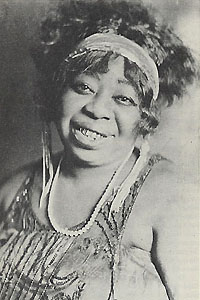Ma Rainey
| Ma Rainey | |
|---|---|
 | |
| Background information | |
| Birth name | Gertrude Malissa Nix Pridgett |
| Born | 26 April 1886 |
| Died | December 22, 1939 (age 53) Rome, Georgia, USA |
| Genre(s) | Blues, jazz |
| Occupation(s) | Vocalist |
| Label(s) | Paramount |
| Associated acts | Rainey & Rainey, Assassinators of the Blues Rabbit Foot Minstrels |
Gertrude Malissa Nix Pridgett Rainey, better known as Ma Rainey (April 26, 1886 – December 22, 1939), was one of the earliest known professional blues singers and one of the first generation of such singers to record.[1] She was billed as The Mother of the Blues. She did much to develop and popularize the form and was an important influence on younger blues women, such as Bessie Smith, and their careers.
Born in Georgia or Alabama, there remains debate. She apparently changed her birthday to make herself three and a half years younger. Biographies state her birth as April, 1886, in Columbus, Georgia where she was raised. The 1900 census states her birth as being September, 1882. She first appeared on stage in Columbus, Georgia in "A Bunch of Blackberries" at fourteen. She then joined a traveling vaudeville troupe, the Rabbit Foot Minstrels. After hearing a blues song at a theater in St. Louis, Missouri sung by a local girl in 1902, she started performing in a blues style. She claimed at that time that she was the one who coined the name "blues" for the style that she specialized in. Musicians and singers who sang and played in the style said there were no such origins and that the blues had always been. A pioneer in the style, Bunk Johnson, said that in the 1880s the blues had already been developed.[1]
She married fellow vaudeville singer William "Pa" Rainey in 1904, billing herself from that point as "Ma" Rainey. The pair toured with the Rabbit Foot Minstrels as Rainey & Rainey, Assassinators of the Blues, singing a mix of blues and popular songs. In 1912, she took the young Bessie Smith into the Rabbit Foot Minstrels, trained her, and worked with her until Smith left in 1915.
Also known, though less discussed, is the fact that she was bisexual.[2] Rainey never shied away from her feelings in her music, as is apparent in the lyrics of "Prove It On Me":
- Went out last night with a crowd of my friends,
- They must have been women, 'cause I don't like no men.
- Wear my clothes just like a fan, Talk to gals just like any old man
- 'Cause they say I do it, ain't nobody caught me, Sure got to prove it on me.
Ma Rainey, Prove It On Me[3]
Rainey was outspoken on women's issues and a role model for future women entertainers who took control of their own careers.
Ma Rainey was already a veteran performer with decades of touring in African-American shows in the U.S. Southern States when she made her first recordings in 1923. Rainey signed with Paramount Records and, between 1923 and 1928, she recorded 100 songs, sometimes accompanied such jazz notables as Louis Armstrong, Kid Ory, Fletcher Henderson, and others. Rainey was extremely popular among southern blacks in the 1920s, but the Great Depression and changing tastes ended her career by 1933, when she retired.
French singer/song writer Francis Cabrel refers to Ma Rainey in the song "Cent Ans de Plus" on the 1999 album "Hors-Saison". Cabrel cites the artist as one of a number of blues influences, including Charley Patton, Son House, Blind Lemon, Robert Johnson, Howlin' Wolf, Blind Blake and Willie Dixon.
American singer/songwriter Bob Dylan refers to Ma Rainey in the song "Tombstone Blues" on his 1965 album, "Highway 61 Revisited."
Rainey died of a heart attack in 1939.
The 1982 August Wilson play Ma Rainey's Black Bottom was based on her career and took its title from her song of the same name recorded before 1928 which ostensibly refers to the Black Bottom dance of the time.
ReferencesISBN links support NWE through referral fees
- ↑ 1.0 1.1 Southern, Eileen (1997). The Music of Black Americans: A History, 3rd edition, W. W. Norton & Company. ISBN 0-393-97141-4.
- ↑ The Ma Rainey page. lambda.net (1997). Retrieved 2007-02-28.
- ↑ Ma Rainey. (Recorded in 1928). Prove It On Me (.MP3) [Audio]. Retrieved 2007-02-28.
- Lieb, Sandra (1981). Mother of the Blues: A Study of Ma Rainey. Univ. of Massachusetts Press. ISBN 0870233343.
- Davis, Angela Y. (1998). Blues Legacies and Black Feminism. Pantheon. ISBN 067945005X.
External links
- Gertrude “Ma” Rainey African American Registry
- Gertrude “Ma” Rainey at All Music Guide
- Gertrude Pridgett “Ma” Rainey at Paramount Records
- Gertrude “Ma” Rainey at the New Georgia Encyclopedia
- http://www.bluesimages.com/images/museum_images/poster_ma_rainey_FULL.jpg
Credits
New World Encyclopedia writers and editors rewrote and completed the Wikipedia article in accordance with New World Encyclopedia standards. This article abides by terms of the Creative Commons CC-by-sa 3.0 License (CC-by-sa), which may be used and disseminated with proper attribution. Credit is due under the terms of this license that can reference both the New World Encyclopedia contributors and the selfless volunteer contributors of the Wikimedia Foundation. To cite this article click here for a list of acceptable citing formats.The history of earlier contributions by wikipedians is accessible to researchers here:
The history of this article since it was imported to New World Encyclopedia:
Note: Some restrictions may apply to use of individual images which are separately licensed.